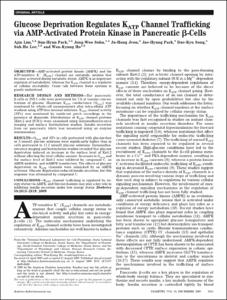Glucose Deprivation Regulates KATP Channel Trafficking via AMP-Activated Protein Kinase in Pancreatic β-Cells
- Keimyung Author(s)
- Park, Jae Hyung; Song, Dae Kyu
- Department
- Dept. of Physiology (생리학)
- Journal Title
- Diabetes
- Issued Date
- 2009
- Volume
- 58
- Issue
- 12
- Abstract
- OBJECTIVE AMP-activated protein kinase (AMPK) and the ATP-sensitive K+ (KATP) channel are metabolic sensors that become activated during metabolic stress. AMPK is an important regulator of metabolism, whereas the KATP channel is a regulator of cellular excitability. Cross talk between these systems is poorly understood.
RESEARCH DESIGN AND METHODS Rat pancreatic β-cells or INS-1 cells were pretreated for 2 h at various concentrations of glucose. Maximum KATP conductance (Gmax) was monitored by whole-cell measurements after intracellular ATP washout using ATP-free internal solutions. KATP channel activity (NPo) was monitored by inside-out patch recordings in the presence of diazoxide. Distributions of KATP channel proteins (Kir6.2 and SUR1) were examined using immunofluorescence imaging and surface biotinylation studies. Insulin secretion from rat pancreatic islets was measured using an enzyme immunoassay.
RESULTS Gmax and NPo in cells pretreated with glucose-free or 3 mmol/l glucose solutions were significantly higher than in cells pretreated in 11.1 mmol/l glucose solutions. Immunofluorescence imaging and biotinylation studies revealed that glucose deprivation induced an increase in the surface level of Kir6.2 without affecting the total cellular amount. Increases in Gmax and the surface level of Kir6.2 were inhibited by compound C, an AMPK inhibitor, and siAMPK transfection. The effects of glucose deprivation on KATP channels were mimicked by an AMPK activator. Glucose deprivation reduced insulin secretion, but this response was attenuated by compound C.
CONCLUSIONS KATP channel trafficking is regulated by energy status via AMPK, and this mechanism may play a key role in inhibiting insulin secretion under low energy status.
- Publisher
- School of Medicine
- Citation
- Ajin Lim et al. (2009). Glucose Deprivation Regulates KATP Channel Trafficking
via AMP-Activated Protein Kinase in Pancreatic β-Cells. Diabetes, 58(12), 2813–2819. doi: 10.2337/db09-0600
- Type
- Article
- ISSN
- 0012-1797
- Appears in Collections:
- 1. School of Medicine (의과대학) > Dept. of Physiology (생리학)
- 파일 목록
-
-
Download
 oak-aaa-01597.pdf
기타 데이터 / 389.82 kB / Adobe PDF
oak-aaa-01597.pdf
기타 데이터 / 389.82 kB / Adobe PDF
-
Items in Repository are protected by copyright, with all rights reserved, unless otherwise indicated.